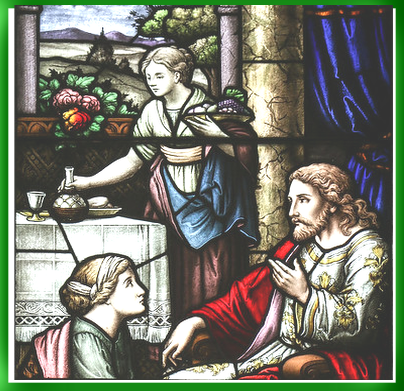17 July 2022
Genesis 18:1-10 Colossians 1:24-28 Luke 10:38-42
Theme: Welcoming the Word of God
‘When we share, that is poetry in the prose of life.’ So wrote Sigmund Freud. The tradition of hospitality is a notable characteristic of all civilisations and cultures. Indeed, hospitality ranks among the most highly acclaimed virtues in the Bible. The examples of Elijah receiving hospitality from a poor widow of Zarephath (1 Kings 17-18) and of Elisha being hosted by a wealthy Shunammite woman (2 Kings 4:8ff) spring to mind. Today’s first reading from the book of Genesis illustrates the hospitality of Abraham, our father in Faith. It describes how he welcomed three strangers into his tent with great kindness and generosity. On seeing them, he runs out to greet them and bows down in respect before them. Then he offers them water to wash their feet and invites them to rest while he and his wife, Sarah, prepare a lavish meal for them. One of these strangers happens to be the Lord himself and Abraham’s hospitality is rewarded with the good news that his wife, Sarah, will bear him a son: ‘I shall visit you again next year without fail, and your wife will then have a son’ (Gen 18:10). In welcoming strangers, Abraham and Sarah met their Lord and were abundantly blessed. In reminding us of the importance of hospitality, the author of the Letter to the Hebrews surely had in mind the example of Abraham when he wrote: ‘Do not neglect hospitality, for through it, some have unknowingly entertained angels’ (Hebrews 13:2).
Today’s gospel reading features Jesus as the recipient of hospitality in the home of Martha in Bethany: ‘Jesus came to a village, and a woman named Martha welcomed him into her house’ (Lk 10:38). We are accustomed to think of Jesus as the great Giver, the one who came on earth ‘not to be served but to serve, and to give his life for the ransom of many’ (Mt 20:28). But Jesus, the fully human one, also needed the love and care of others. And he was able to receive it graciously. Some people are very good at giving, at spending their lives in the service of others, but not good at receiving from others. They don’t want to be in anyone’s debt, or to admit needing the love and care of others. But it is as important to be able to receive as to give. Giving and receiving are complementary and inseparable dimensions of love. In the prayer of St Francis, we pray that ‘it is in giving that we receive’ but it is equally true that in receiving graciously we also give and become a channel of God’s grace for others.
In the gospel story we have just heard, Martha, as the head of the house, is the one who welcomes Jesus and serves him. She is the epitome of the caregiver. She immediately begins setting the table and preparing a meal for Jesus. I have the impression that she was also a bit of a fusspot, overly anxious about making a good impression on her honoured guest. Mary, her sister, comes across as a more relaxed person, comfortable in her own skin, a good listener. Clearly, Jesus loved both of them very much. Along with their brother, Lazarus, they were among Jesus’ closest friends. However, there is no mention of Lazarus in today’s story and Jesus finds himself, a single man, in the company of the two sisters. Surprisingly, in light of the cultural customs of his day, he is quite at ease in the company of these women. In her own way, Mary makes Jesus welcome by sitting at his feet – the posture of a disciple – and listening to him. While Martha is preparing a meal for Jesus, Mary is allowing Jesus to nourish her with his life-giving word. She epitomises the receiving person. And when Martha complains to Jesus that, because of his conversation with Mary, she is being left ‘to do the serving all by herself’ (Lk 10:40), he chides her gently: ‘Martha, Martha, you worry and fret about so many things, and yet few are needed, indeed only one. It is Mary who has chosen the better part’ (Lk 10:41).
Sometimes the story of Martha and Mary has been interpreted to contrast the different vocations of the active and contemplative apostolates, with the latter being presented as superior to the former. I don’t think that this is the point of the story at all. Jesus is not downplaying Martha or her role of service. He reproves her because she wanted Mary to abandon him and help her with the serving. Martha failed to accept or appreciate the role of Mary in making Jesus feel welcome by listening to him. The importance of Mary’s example should not be lost on us as it was seemingly lost on Martha. Christian discipleship involves both prayer (listening to the word of God) and action (service of others). We are called to be both listeners to the Word and doers of the Word. And we will not be doers of the Word unless we are first listeners. Without prayerful listening to the Word of God, our activity, however well-intentioned, may not lead to the spread of the gospel or the growth of God’s kingdom in the world. God’s missionary purpose can only be gleaned from a profound listening to the voice of his Spirit. The example of Mary serves as a salutary antidote to our noisy, restless, hyperactive age, which, in the words of the poet, T.S. Eliot,
‘Brings knowledge of motion, but not of stillness,
knowledge of speech, but not of silence;
Brings knowledge of words, and ignorance of the Word.
Michael McCabe SMA, Cork
To listen to an alternative Homily from Fr Tom Casey of the SMA Media Centre, Ndola, Zambia please click on the play button below.
|
|

